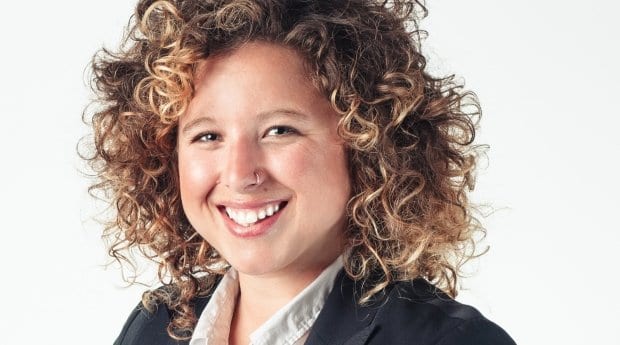Coree Tull’s experiences with sports in Vancouver haven’t always been positive. While the dodgeball team she played on with her wife, Kathryn, was made up predominantly of openly queer people, she found the rest of the league wasn’t always as welcoming.
“It got to a point where it just wasn’t fun. We were playing against people who would revert back to, like, high school or something,” she recalls. It got to the point where they were leaving games feeling dispirited.
That’s when they decided to create their own inclusive Double Rainbow Dodgeball league, where people of all genders, including trans people, are explicitly welcome. The response has exceeded any of their expectations; the league has grown from five teams to 17 within three years.
“I never would have guessed that there was this need for this sort of space,” Tull says. “I think that it’s really amazing to see people who come up to us and they talk about how they look forward to Tuesday night because it’s a space where they can come and be themselves, and they can be silly and they can be celebrated.”
It’s a feeling that she would like to help foster citywide, which is why she’s running for the Board of Parks and Recreation with Vision Vancouver.
Tull, who has also served as co-chair of Out in Sports and on the board of the Mabel softball league for lesbian, bisexual, straight women and trans people, says she was motivated to take her community organizing skills to the next level when she saw the work being done by the parks board’s Trans and Gender Variant Working Group. She sees the 77 recommendations that the group proposed and the board accepted earlier this year as a monumental step for inclusivity, as well as indicative of a caring board.
Inspired by the ways in which the working group and the parks board worked with community to address the barriers that kept some people from feeling comfortable in recreational spaces, Tull says she decided that she wanted to participate, too.
She says she wants to help create a political atmosphere that fosters conversations within the community. The more opportunities there are for communication, she says, the greater the opportunities are for growth within the community.
“It’s exciting to know that we have elected representatives that are listening to the voices of the LGBT community and really standing up and advocating for those rights,” she says.
“We don’t have a lot of young, queer people — predominantly young, queer women — involved in politics,” she says. “I want to ensure that the queer community is represented at the table, along with other communities, but that’s obviously the experience that I am able to bring.”
She says she’s committed to creating safe and accessible recreation spaces, not just within the LGBT community, but for people with disabilities, senior citizens, new immigrants and people with low income as well.
Ultimately, Tull is interested in fostering conscious individuals and consciously designed, inclusive spaces. She wants people to be able to walk into recreational spaces and feel they are exactly where they should be.

 Why you can trust Xtra
Why you can trust Xtra


